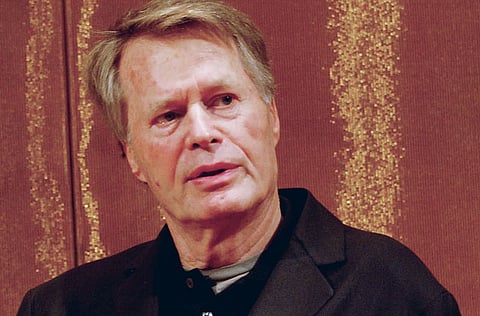Rich with experiences
Nobel winner J.M.G. Le Clezio's eventful life finds reflection in his writings

J.M.G. Le Clézio, who in 2008 became the first French-language author in 23 years to win the Nobel Prize in Literature, had hoped to launch his career with English detective stories. After reading English at Bristol University in the late 1950s, he wrote mysteries while teaching at a school in Bath and shifting furniture in a junk shop in London. But his stories were rejected by publishers in the United Kingdom. "So I decided to write in French," he says.
His novel The Interrogation (1963) was about a dropout squatting in a holiday home on the French riviera, unsure whether he has deserted from the army or escaped from a lunatic asylum. Its tall, diffident author was dubbed French literature's Steve McQueen and photographed by Henri Cartier-Bresson as the new icon of the Left Bank.
Varied cultural background
Yet Le Clézio, born in the south of France with a Breton surname, Mauritian grandparents, a French mother and a British father working as a doctor in Nigeria, has never identified with Paris. Now a dual Franco-Mauritian citizen, he says: "I've always felt very much from a mixed culture.... Everything's had its influence on me."
For the Nobel committee, his work is a "critique of civilisations". He has written more than 40 books of fiction, memoir, children's literature and essays. For one admirer, Adam Gopnik, while his lesser work can "sound like the narration of a Unicef documentary", his greatest conveys a "classical poise" the "empathetic description of entire worlds".
The first English translation of his breakthrough novel Desert, by C. Dickson, was published by Atlantic in February. First out 30 years ago, it won the French Academy's Grand Prix Paul-Morand and sold more than a million copies.
Desert was partly inspired by tales told him by Jmia, who was born in Morocco. He also reused a story about resisting colonial rule, The White Sheik, which he wrote aged 15 after a trip to French Morocco with his father. In Desert, the Tuareg wage a holy war against Christian invaders whose true religion is money.
Jean-Marie Gustave Le Clézio was born in 1940, two months before France fell to Nazi Germany. Thinking the Germans would occupy Provence, his mother, Simone, drove with her two sons to Brittany. "As soon as we arrived, the Germans arrived, and sent us back." The south was occupied by fascist Italy in 1942, then by Germany. "I was very hungry at the end of the war, begging for food from the Americans, who were giving away white bread and chocolate. That's written in my memory."
War remains an obsession. He has kept a German document "describing my family as a ‘bunch of refugees'." He depicted wartime Nice in his novel Wandering Star (1992), with its twin narratives of two girls — one a French-Jewish refugee to Israel, and the other a Palestinian in Nour Shams refugee camp.
Because of the war, Le Clézio did not meet his father, Raoul, till he was 8. While his father loved English literature, "my grandmother hated the English, a tradition with the old French Mauritians. I couldn't choose sides."
His forebears belonged to the sugar plantocracy but lost their estate in a family feud and scattered, becoming judges or doctors. Le Clézio's descent from slave-holders shaped his scepticism towards the Enlightenment. "I can understand better than most the contradiction between the idealistic civilisation and religious morals of Europe and what they did with the slaves, because the root of the evil is only two generations away from me," he says. "Maybe this has fed my need to fight against the abuses of modern civilisation. Maybe it's inspired my novels — it's present in my mind."
From place to place
He was spared the draft to Algeria by gaining entrance to a university in Nice. The Algerian war over, he did four years' national service in Thailand and Mexico. He was expelled from Thailand, possibly for showing Mao's "little red book" to students at the Buddhist university, or for denouncing the trafficking of children in a French newspaper interview.
In the early 1970s he spent three crucial years with Ember and Waunana Indians in the forests of the Darien Gap. He used what he learnt of Europe's encounter with the Amerindians to revisit his own origins. In the major, untranslated novel Revolutions (2003), a student's life in Nice, London and Mexico in the 1950s and 1960s is interwoven with that of a Breton ancestor and an enslaved woman in 19th-century Mauritius. His latest novel, Ritournelle de la faim (2008), which he wrote while teaching in South Korea, looks back to his mother's generation of Mauritians in Paris between the wars.
President Nicolas Sarkozy claimed Le Clézio embodied the "influence of France ... in a globalised world". Yet in 2007 Le Clézio was among 44 authors who signed a manifesto calling for a "world literature in French", in which France was no longer the centre. He dedicated his Nobel to writers in many languages.
Though he does not believe all cultures have an equal voice, "it's still better than it was when I was a child". Le Clézio once said he wrote "to try to know who I am".
He views himself as a "product of Western civilisation, which invented extraordinarily beautiful things and at the same time behaved terribly. Maybe I'm blinded by those obsessions." He is at work on a novel, Alma Mater, about his family, "on the one hand, slave-buyers, and on the other, highly cultivated and good people". He looks bemused. "It's a contradiction I haven't solved."
Sign up for the Daily Briefing
Get the latest news and updates straight to your inbox

